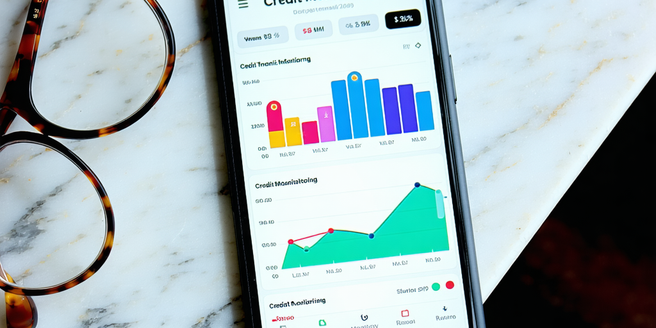Understanding the Importance of Credit Score Monitoring
| Aspect | Description | Benefit |
| Accuracy | Ensures your credit score is correct | Prevents erroneous declines |
| Tracking | Monitors changes over time | Identifies trends |
| Alerts | Notifies you of score changes | Allows for proactive action |
| Education | Provides insights and tips | Improves financial literacy |
| Security | Protects against identity theft | Prevents fraud |
| Access | Availability of scores anytime | Convenience and control |
Key Features to Look for in a Monitoring Tool
When selecting a credit score monitoring tool, it’s crucial to evaluate key features that will meet your financial goals and needs. First, assess whether the tool provides real-time alerts, which can help you stay ahead of potential issues like identity theft or unexpected score changes. Next, look for a tool that offers comprehensive reporting, giving you insights into what factors are affecting your credit score. The ability to access historical score data and trends is also beneficial for understanding your financial behaviors over time. Moreover, some tools offer simulation features that predict how certain actions might impact your score. User-friendliness and accessibility are equally important; the tool should have a simple interface and be available on different devices. Lastly, consider whether the tool integrates with other financial services you use, as this can simplify and enhance your financial management.
Comparison of Top Credit Score Monitoring Tools
Choosing the right credit score monitoring tool involves evaluating various options in the market to find what suits your needs best. Some of the top-rated tools include Credit Karma, known for its free access and easy-to-understand reports. It offers personalized advice to improve your financial health. Another option is Experian Boost, unique in allowing users to increase their FICO score instantly by adding utility and telecom payments to their credit file. MyFICO, though paid, provides a comprehensive view of multiple credit scores used by lenders. PrivacyGuard is notable for its robust identity theft protection features alongside credit monitoring. Lastly, IdentityForce, known for its excellent customer service, offers a wide array of monitoring tools and alerts. Each of these tools has unique features and costs, so it’s essential to align your selection with your financial priorities.
How Real-Time Alerts Can Benefit You
Real-time alerts are a pivotal feature of credit score monitoring tools, offering numerous benefits to help you manage your financial health. Firstly, they provide immediate notification of changes to your credit report, enabling you to act swiftly in the case of fraudulent activities or identity theft. Early detection is critical to preventing long-term financial damage or loss. Secondly, these alerts keep you informed about any new inquiries or accounts added, allowing you to confirm authorized activities. This awareness can also act as a motivating factor to maintain your credit health actively. Real-time updates also provide peace of mind by keeping you in control of your financial standing at all times. In today’s fast-paced world, staying informed quickly can mean the difference between a minor issue and a large financial setback. Consequently, the presence of real-time alerts is a crucial criterion when selecting a monitoring tool.
Budget-Friendly Monitoring Options for Beginners
For those just starting with credit score monitoring, budget-friendly options provide a good balance of essential features without the high costs. Credit Karma is a popular choice for beginners due to its free service and easy-to-understand user interface. It offers both credit scores and reports, alongside valuable tips to help improve your score. Another great free option is WalletHub, which provides daily updates to your credit score and analysis to help track your credit health. Mint is another cost-effective choice; though primarily a budgeting tool, it offers basic credit monitoring functions that can be of value to users who are new to such tools. For a paid option, consider MyScoreIQ, which offers robust monitoring at a cost-effective price. As you explore these options, it’s important to consider the specific features offered and decide which ones align with your current financial needs and skills.
Advanced Tools for Comprehensive Score Analysis
For individuals seeking a more in-depth understanding of their credit situation, advanced tools provide comprehensive score analysis. These tools offer features that go beyond basic monitoring, such as detailed breakdowns of factors influencing your score and predictive modeling, which forecasts how financial decisions could impact your score. Experian Boost and myFICO are among those that provide such sophisticated functionalities. MyFICO, for instance, grants access to various FICO scores and detailed reports used by lenders to make credit decisions. Additionally, tools like IdentityForce offer robust identity theft protection as part of their premium packages. These advanced capabilities are ideal for individuals who wish to have a granular understanding of their credit profile and wish to take a proactive approach to manage their financial health. Consider these options if you’re looking for more than basic monitoring and are interested in leveraging your credit score for financial growth.
Integrating Credit Monitoring with Financial Planning
The integration of credit monitoring with financial planning is a strategic approach to achieving comprehensive financial health. By linking these two aspects, individuals can gain a holistic view of their financial standing and make informed decisions. Many credit score monitoring tools offer features that align with budgeting and financial planning apps. For example, Mint not only provides credit score tracking but also helps manage spending and budgeting, thereby delivering insights into how your financial activities impact your overall credit health. Similarly, Quicken provides credit monitoring as part of a broader financial management suite, enabling users to track and improve their financial well-being efficiently. When credit monitoring is part of your financial planning strategy, it encourages accountability and aids in setting realistic financial goals. This integrated approach ensures that you’re not only keeping track of your score but also aligning it with your broader financial aspirations.
Common Pitfalls to Avoid When Choosing a Tool
When selecting a credit score monitoring tool, it’s important to avoid common pitfalls that might compromise your financial management. One critical error is not thoroughly researching the features and costs associated with different tools, which can lead to choosing a service that doesn’t meet your needs or budget. Another mistake is overlooking the importance of security; ensuring that the tool has robust data protection measures is crucial since it will have access to sensitive financial information. Some users might also neglect to read the fine print regarding the type of credit score provided — it’s important to know whether a tool offers the FICO score, VantageScore, or another type. Additionally, be wary of services with hidden fees or those that require a lengthy subscription commitment upfront. Staying informed and asking the right questions when choosing a tool will go a long way in finding an ideal solution tailored to your financial requirements.
How Monitoring Tools Protect Against Identity Theft
Credit score monitoring tools play a vital role in protecting against identity theft by providing early detection and alerts for suspicious activities. Many tools offer real-time notifications that inform you of any critical changes to your credit report, such as new accounts opened or unusual spending patterns. This swift alert system allows you to take immediate action if unauthorized activities are detected, minimizing potential financial damage. Some advanced tools also include identity theft protection services, which can monitor the dark web for illegal trading of your personal information and offer recovery assistance in case of a breach. Moreover, these tools educate users on how to protect their information and avoid common scams that lead to identity theft. By providing these protective measures, credit score monitoring tools not only help preserve your financial health but also offer peace of mind by safeguarding your identity from fraudulent threats.
Future Trends in Credit Score Monitoring Technology
The future of credit score monitoring technology promises exciting advancements aimed at improving financial health access and understanding. One emerging trend is the integration of artificial intelligence and machine learning to offer more accurate and personalized credit insights. Tools are becoming increasingly adept at analyzing large datasets to predict credit behavior and offer tailored advice. Additionally, there’s a growing focus on user-interface improvements, making it easier for consumers to understand and interact with their credit data. Blockchain technology is also being explored to enhance security and transparency in credit reporting. The rise of open banking is allowing consumers greater control over their financial data, which can lead to more comprehensive and innovative credit monitoring tools. As the financial technology landscape evolves, these advancements are set to offer consumers unprecedented control, insight, and security in managing their credit and financial well-being.



